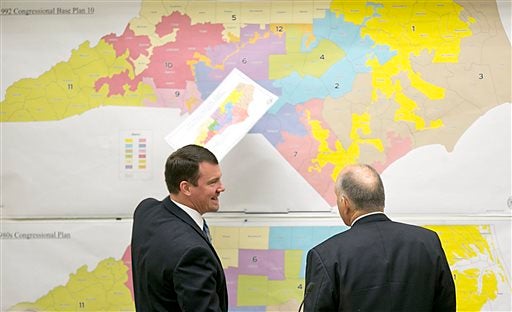Colin Campbell: ‘Special master’ is good news for Democrats
Published 12:35 am Tuesday, November 7, 2017

- State Sens. Dan Soucek, left, and Brent Jackson review historical maps during a Senate Redistricting Committee meeting in 2016, in Raleigh. (Corey Lowenstein/The News & Observer via AP)
RALEIGH — A law professor out in California could end up having a big impact in North Carolina’s 2018 elections for the state legislature. Nathaniel Persily of Stanford University recently got a $500-an-hour job from federal court judges, who have charged him with drawing new district lines for nine House and Senate districts that the judges think may have been unconstitutionally gerrymandered.
Persily’s official title is “special master” — a legal term that makes him sound like a minor Star Wars character — and Democrats are rejoicing over his hiring. “I believe this will give us the chance to re-tilt the balance of power in the legislature and help us in the 2018 elections,” said Rep. Graig Meyer, D-Orange, in a Facebook video, shortly before hitting up his followers for campaign donations.
But the latest round of maps won’t necessarily be a slam dunk for Democrats. Persily is only supposed to redraw a fraction of legislative districts, so most of the state will still be voting in districts drawn to help Republicans win the majority. Still, most districts slated for changes are in urban counties like Wake, Mecklenburg and Guilford — where incumbents in Republican-leaning districts have sometimes faced tough re-election challenges in recent elections under the old maps.
Persily’s maps could help a few more Democrats get elected, but it’s still highly unlikely they’ll be able to win a majority in the House or Senate. Most Democrats are being realistic and focusing on flipping at least four Republican-held seats in the House to end the GOP’s veto-proof majority. Veto overrides require a three-fifths majority vote in both chambers, and if Republicans can’t reach that number, Gov. Roy Cooper’s veto stamp will finally mean something.
Not surprisingly, Republican legislative leaders view the special master as a special problem. Their attorneys tried unsuccessfully to get judges to give the legislature another shot at drawing maps: The “third time’s the charm” approach. And they attacked the credentials of Persily, who they argue “has many media appearances and published works relating to North Carolina redistricting which raise questions about his ability to fairly assess the plans before the court.” They also point to personal and professional connections between Persily and some of the attorneys in the redistricting case.
Persily’s academic research specializes in redistricting, so he’s a go-to source for reporters who need an expert commentator. He’s also held the “special master” title before, redrawing districts under court orders in several other states. It would be hard to find a redistricting expert who hasn’t made statements about redistricting. If Persily shows any bias in drawing the districts, the issue will likely come up in the court hearings in January before the judges give their final approval.
Persily is operating under specific instructions from the court. He can only tweak districts that border the disputed districts. He’s supposed to protect incumbent legislators where possible. And he can consider racial demographic data, but only to correct racially gerrymandered districts that the court says legislators failed to fix in their new maps. Persily also must address several districts that were changed in this year’s redraw even though they weren’t part of the gerrymandering problem. His deadline is Dec. 1.
But Persily and the federal judges he’s working for might not have the last word. Legislative leaders could ask the U.S. Supreme Court to throw out the special master ruling. It’s unclear what would happen under that scenario, but the clock is ticking toward next year’s election: Candidate filing begins in February and many campaigns are already beginning now — even with uncertain district lines.
Colin Campbell is editor of the Insider State Government News Service.

